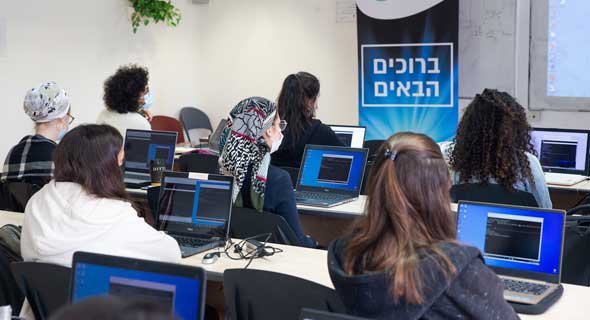The Jerusalem College of Technology launches Cyber Elite 2.0 for underrepresented groups
This year’s cohort is composed of 36 students - 17 women and 19 men - and will last a total of 10 months
Cyber Elite 2.0 follows a successful pilot of the program which started in the 2017-2018 academic year, in partnership with the Cyber Education Center, the National Cyber Directorate of the Prime Minister’s Office, and cyber companies. The program trained 31 participants - 15 women and 16 men - in cybersecurity R&D positions in defense and commercial companies. This year’s cohort is composed of 36 students - 17 women and 19 men - and will last a total of 10 months.
 Some of the students in the Cyber Elite 2.0 cohort. Photo: Michael Erenburg
Some of the students in the Cyber Elite 2.0 cohort. Photo: Michael Erenburg
“At its core, Israeli ingenuity is about best utilizing and amplifying the ideas and skills of the people of Israel,” said Orlee Guttman, Director of the Cyber Elite program. “We are thrilled that Cyber Elite will be able to provide the country with new, incredible talent that previously would never have had an entry into the cyber world. These men and women will bring major added value to the country's commercial and defense cyber industries.”
The program is made possible following the pilot’s success, which was recognized by the Israel Innovation Authority who awarded JCT with a grant for two Cyber Elite cohorts for the academic years of 2021-22 and 2022-23. Attendees will learn about malware analysis, penetration testing, network security, and vulnerabilities and exploitations, with training provided by industry experts and former military intelligence personnel.
- Israel’s next challenge: filling the talent void
- Israeli Innovation Authority hoping to reduce tech talent shortage with new Human Capital Fund
- Israel’s tech industry suffers from a chronic employee shortage, report warns
It is understood the participants will spend two days at JCT’s campuses and the remaining three days a week to work at a variety of R&D labs of the cyber units of Israeli companies such as Check Point, Cymotive, Intel, CYE, ARMO, Israel Aerospace Industries/Elta Systems, Rafael Advanced Defense Systems, Cellebrite, and more.
The conventional path to senior positions in Israel’s cyber industry is usually via the IDF and its cyber military units. However, this makes it difficult for those in ultra-orthodox communities who do not serve and are therefore not represented in that industry. The Cyber Elite 2.0 cohort is also coming at a time where companies across the country are facing unprecedented challenges to fill vacant job positions and a talent void felt across the country.
“Virtually all of my co-workers came through the IDF, people with many years of experience,” explained Yechiel Levin, a graduate of the Cyber Elite pilot from a religious school system who has been working as an engineer in the cyber industry ever since. “I wouldn’t have been able to reach my current cyber security position through a regular job, no matter how talented and professional I am. The skills that we attained throughout the Cyber Elite program and the connections that we made with the industry enabled me to get to where I am today.”
The ultra-Orthodox population makes up only 3% of the tech workforce and makes considerably less money than their secular counterparts (10,800 shekels per month vs. 22,500 shekels).
The Jerusalem College of Technology was established in 1969 and is one of the country’s most prestigious higher education institutions with a focus on science and technology. It also is committed to providing academic education to diverse segments of Israeli society, developing programs designed specifically for ultra-orthodox men and women.



